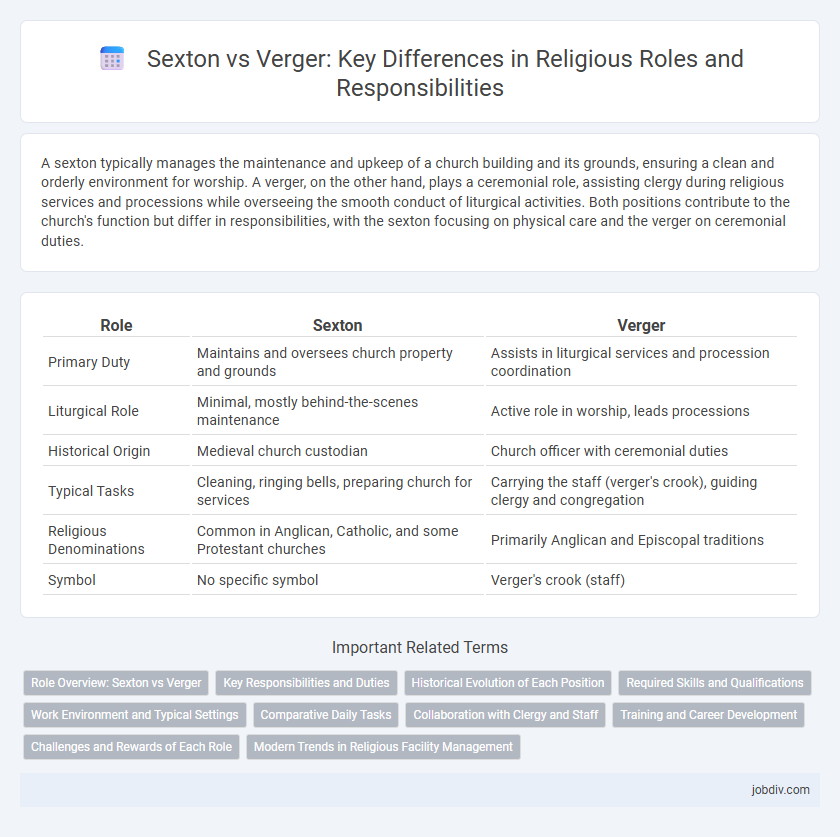A sexton typically manages the maintenance and upkeep of a church building and its grounds, ensuring a clean and orderly environment for worship. A verger, on the other hand, plays a ceremonial role, assisting clergy during religious services and processions while overseeing the smooth conduct of liturgical activities. Both positions contribute to the church's function but differ in responsibilities, with the sexton focusing on physical care and the verger on ceremonial duties.
Table of Comparison
| Role | Sexton | Verger |
|---|---|---|
| Primary Duty | Maintains and oversees church property and grounds | Assists in liturgical services and procession coordination |
| Liturgical Role | Minimal, mostly behind-the-scenes maintenance | Active role in worship, leads processions |
| Historical Origin | Medieval church custodian | Church officer with ceremonial duties |
| Typical Tasks | Cleaning, ringing bells, preparing church for services | Carrying the staff (verger's crook), guiding clergy and congregation |
| Religious Denominations | Common in Anglican, Catholic, and some Protestant churches | Primarily Anglican and Episcopal traditions |
| Symbol | No specific symbol | Verger's crook (staff) |
Role Overview: Sexton vs Verger
A sexton is primarily responsible for the maintenance and care of the church building, including tasks such as ringing bells, preparing the altar, and maintaining church grounds. A verger's role involves leading processions, assisting clergy during services, and ensuring the smooth conduct of liturgical ceremonies. Both positions support church operations but differ in their focus on physical upkeep versus ceremonial duties.
Key Responsibilities and Duties
A sexton is primarily responsible for the maintenance and care of the church building, including managing the church grounds, handling set-up for services, and ensuring the security of the premises. A verger, on the other hand, focuses on liturgical duties such as assisting clergy during worship services, organizing processions, and coordinating rehearsals for ceremonies. Both roles support the smooth operation of religious services but differ in their emphasis on physical upkeep versus ceremonial coordination.
Historical Evolution of Each Position
The sexton historically served as a church custodian responsible for maintenance, bell ringing, and grave digging, with origins tracing back to the early medieval church. The verger, emerging later in the Middle Ages, took on ceremonial duties including leading processions and assisting clergy during services, reflecting an evolution towards liturgical organization. Over centuries, the roles diverged, with the sexton focusing on practical stewardship and the verger embodying the symbolic and ritual aspects of church life.
Required Skills and Qualifications
A Sexton typically requires skills in building maintenance, custodial duties, and knowledge of church property management, often needing experience in general repairs and groundskeeping. A Verger must possess strong organizational abilities, leadership qualities, and familiarity with liturgical practices, often coupled with experience in coordinating religious services and managing ceremonial protocols. Both roles demand a commitment to maintaining the sanctity and functionality of church operations, but the Sexton focuses on physical upkeep while the Verger emphasizes ceremonial coordination.
Work Environment and Typical Settings
Sextons typically operate within church buildings, overseeing maintenance, bell ringing, and preparation for worship services, often working in quiet, orderly environments that emphasize routine tasks. Vergers perform ceremonial duties, guiding processions and assisting clergy during services, frequently found in large cathedrals or churches with significant public attendance. Both roles involve close collaboration with clergy and church staff, but sextons focus more on operational support while vergers engage directly in liturgical functions.
Comparative Daily Tasks
A sexton manages the daily maintenance of the church building, including cleaning, repairs, and preparing the space for worship services, while a verger focuses on coordinating the order of liturgical services, assisting clergy, and ensuring ceremonial elements are properly arranged. Sextons handle physical upkeep and practical support tasks, often involving groundskeeping and security responsibilities. Vergers perform ceremonial duties, guiding processions and managing vestments and sacred vessels to facilitate smooth worship experiences.
Collaboration with Clergy and Staff
Sextons primarily handle maintenance and upkeep of church property, working closely with clergy to ensure the worship environment is clean and orderly. Vergers support liturgical functions by coordinating ceremonies and assisting clergy during services, facilitating smooth collaboration among clergy, choir, and other church staff. Both roles require effective communication and teamwork to uphold the spiritual and operational needs of the church community.
Training and Career Development
Sextons typically undergo practical on-the-job training focused on maintenance, preparation for services, and basic church operations, often advancing through experience and mentorship within the parish. Vergers receive more formalized training that includes liturgical knowledge, ceremonial protocol, and leadership skills essential for coordinating worship services and assisting clergy. Career development for vergers often involves specialized courses and certifying bodies, enabling progression into senior ecclesiastical roles, while sextons primarily develop through hands-on facility management expertise.
Challenges and Rewards of Each Role
A sexton faces the challenge of maintaining the church building and grounds, ensuring all facilities are clean, secure, and functional for worship services and community events. The role rewards a sense of direct contribution to the church's spiritual life by creating a welcoming environment that supports congregational activities. A verger, meanwhile, undertakes the challenge of coordinating liturgical processions and assisting clergy during services, requiring precise knowledge of ecclesiastical protocols and rituals. The rewards for a verger include spiritual fulfillment through active participation in worship and enhancing the solemnity and order of religious ceremonies.
Modern Trends in Religious Facility Management
Sextons traditionally manage the maintenance and upkeep of religious facilities, including groundskeeping and minor repairs, while vergers primarily assist in liturgical functions and ceremonial duties. Modern trends in religious facility management emphasize integrating technology for efficient scheduling, facility automation, and environmental sustainability, reshaping the roles of sextons and vergers towards multifunctional responsibilities. Increasing collaboration between sextons and vergers enhances the seamless operation of worship spaces, reflecting evolving expectations in contemporary faith communities.
Sexton vs Verger Infographic

 jobdiv.com
jobdiv.com